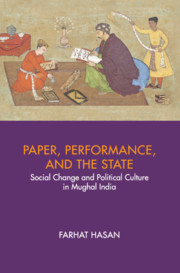Book contents
- Frontmatter
- Dedication
- Contents
- Acknowledgements
- List of Abbreviations
- A Note on Transliteration
- 1 Introduction
- 2 Property and Social Relations: Litigations and Disputes at the Qāzi's Court
- 3 Law as Contested Communication: Literacy, Performativity, and the Legal Order
- 4 Embodiment, Sensoriality, and the Public Sphere: Shifting Popular Perceptions of the State
- 5 State Formation from Below: Authority and Culture in Micro-Spaces
- 6 Towards a Conclusion: The Project of the Nation-State and the Mughal Historian
- Bibliography
- Index
6 - Towards a Conclusion: The Project of the Nation-State and the Mughal Historian
Published online by Cambridge University Press: 07 August 2021
- Frontmatter
- Dedication
- Contents
- Acknowledgements
- List of Abbreviations
- A Note on Transliteration
- 1 Introduction
- 2 Property and Social Relations: Litigations and Disputes at the Qāzi's Court
- 3 Law as Contested Communication: Literacy, Performativity, and the Legal Order
- 4 Embodiment, Sensoriality, and the Public Sphere: Shifting Popular Perceptions of the State
- 5 State Formation from Below: Authority and Culture in Micro-Spaces
- 6 Towards a Conclusion: The Project of the Nation-State and the Mughal Historian
- Bibliography
- Index
Summary
One of the intriguing problems for historians interested in understanding the dynamic of state–society relations is the near-absence of the theme in the dominant Mughal historiography. It is almost an axiom in Mughal history that the period has to be studied within a state-centred frame of reference, one in which the social and cultural world was seen as merely responding to the initiatives of the state. At the risk of oversimplification, it could still be suggested that in modern historiography, relatively recent exceptions apart, the overwhelming picture is one of an active, intrusive state pressing against an inert, passive social world. Given one's ideological predilections, historians disagreed over the nature, extent, and consequences of state intrusion, but the existence of an intrusive state was a self-evident truth. The state was represented in reified terms, insular and domineering – for some historians more so than others – but the narrative plot always moved around the axis of an organized, rational, and bureaucratic state overpowering the ‘docile’ and ‘irrational’ subjects within its dominion. Missing in this thicket of details are the state–society interactions, and how they served to reshape both the political system and the rule structure, as also the social and cultural formations of the period. History is just as much about forgetting as about remembering; what part of the social memory is brought back within history, and what part is excised from record and erased from memory, are political choices that crucially impinge on the project of the nation-state. In seeking to recover the social attributes of the Mughal state and the political agency of people, my work therefore contests a form of politics that seeks to disenfranchise the common people and deny them their history.
Even as these oddities in historiography are typically postcolonial, they have antecedents in the colonial period, and much earlier in the accounts left behind by European travelers in India during the seventeenth and eighteenth centuries. The most-cited account in this context is that by the French traveller Francois Bernier, who had argued that in Mughal India, the ruling aristocracy was the exclusive expropriator of wealth, and its intense exploitative structure prevented distribution of resources, leading to a social system marked by an excess of riches and poverty.
- Type
- Chapter
- Information
- Paper, Performance, and the StateSocial Change and Political Culture in Mughal India, pp. 121 - 131Publisher: Cambridge University PressPrint publication year: 2021



